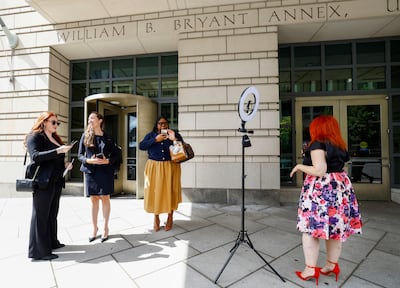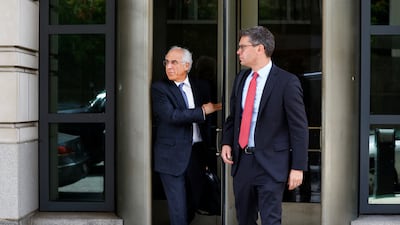TikTok and its Beijing-based parent company, ByteDance, on Monday faced a tough line of questioning at a US appeals court while stating that a law which could force the company to sell its US operations or face a countrywide ban by January 19 would have a “staggering” effect on free speech.
TikTok said the law, passed this year, was aimed at one platform and was infringing on free speech rights. Representatives for the video-sharing app, which is used by 170 million people in the US, said a ban would be a “radical departure from this country’s tradition of championing an open internet”.
TikTok has been a focal point in US-China relations, especially when it comes to data privacy and national security.
It has been at the heart of the Biden administration's efforts to curb what it sees as a growing dominance of Chinese technology apps, which it claims collect US citizens' data. TikTok has repeatedly denied such allegations.
The new law gives ByteDance until January 19 to sell or divest TikTok's US assets or face a complete ban in the US. TikTok and the US Department of Justice have requested a ruling by December 6, which could allow the US Supreme Court to consider any appeal before a ban takes effect.
TikTok's lawyer
The new law will prevent platforms such as Apple's App Store and Alphabet's Google Play Store from offering TikTok, and it will prohibit internet hosting services from supporting the app unless ByteDance divests its US operations by the deadline.
US President Joe Biden has the authority to extend the deadline by up to three months if he determines that ByteDance is moving towards completing the sale.
A panel of three judges – Sri Srinivasan, Neomi Rao and Douglas Ginsburg – heard the arguments in the Court of Appeals for the District of Columbia on Monday.
TikTok, along with a group of content creators, contended that the government has failed to provide evidence of national security risks caused by its operations.
The company has said divestment is “not possible technologically, commercially or legally”.
“This law imposes extraordinary speech prohibition based on indeterminate future risks,” the company's lawyer, Andrew Pincus, told the court.
Mr Pincus said TikTok is not owned by China. “For the first time in history, Congress has expressly targeted a specific US speaker, banning its speech and the speech of 170 million Americans. The owner of TikTok is ByteDance Ltd, a Cayman Islands holding company.”
ByteDance Ltd said the code behind its platform is based in the US. But Mr Srinivasan said that the firm was “subject to Chinese control”.
TikTok: security threat to US
The US government said the threat posed by TikTok’s ties to China and the app pose a “serious national-security threat”. It claimed that ByteDance could be compelled to share the US user data with the Chinese government.
“There is really no dispute here that the recommendation engine is maintained, developed, and written by ByteDance rather than TikTok US,” said Daniel Tenny, a lawyer for the US Department of Justice. “It is not expression by Americans in America – it is expression by Chinese engineers in China.”
The Biden administration has expressed a preference for TikTok's ownership to be transferred to a non-Chinese company rather than imposing a complete ban. Former president Donald Trump, meanwhile, has stated that, if re-elected in November, he would not support a ban on the platform.
Republican candidate Mr Trump and Vice President Kamala Harris, the Democratic candidate, are both active on TikTok. Social media has been an important part of their campaigns.

US authorities cite 'two-fold' risks
There are two main concerns, US Attorney General Merrick Garland told the US court in a 115-page statement submitted on July 30.
First, the TikTok app collects vast amounts of sensitive data from its 170 million US users, including data on users' precise locations, viewing habits and private messages, as well as data on users' phone contacts who do not use TikTok.
Mr Garland expressed concern that the Chinese government could use its authority to take control of this data and thus obtain “access to Americans’ personal and proprietary information”, which China could “stockpile and strategically deploy to undermine the US security”.
Second, the application employed a proprietary algorithm, based in China, to determine which videos are delivered to users.
That algorithm can be manually manipulated, and its location in China would permit the Chinese government to covertly control it and secretly shape the content that American users receive.
“In the end, Congress determined that a legislative solution was warranted and enacted the Protecting Americans from Foreign Adversary Controlled Applications Act … [that] requires TikTok to be divested from Chinese ownership.”
What is the new law that TikTok is fighting?
The Protecting Americans from Foreign Adversary Controlled Applications Act was introduced to address national security concerns. It was passed by the US House of Representatives on March 13 and Mr Joe Biden signed it into law on April 24.
It gave apps such as TikTok between 270 and 360 days to sever ties with entities controlled by foreign adversaries or face bans on distribution and operation in the US.
In May, TikTok told a US federal appeals court that the Department of Justice had misstated the platform's ties to China and urged the court to overturn the law.
Taxpayers’ money is at stake
Industry analysts said that, so far, there is no clear winner or direction after Monday’s arguments, as neither side made a compelling case to shift the outcome.
Given the support for TikTok in the US, analysts foresee a long battle in which “no irreversible or consequential actions” will be taken by the January deadline, said Yashin Manraj, chief executive of US-based Pvotal Technologies.
Public support for a TikTok ban continues to decline, as many American adults are unsure such a ban will happen, according to a Pew Research Centre survey taken during July and August.
The share of Americans who support the US government banning TikTok stood at 32 per cent, down from 50 per cent in March 2023, it revealed.
Almost 28 per cent of Americans oppose a ban, up from 22 per cent in March last year. The share who say they are uncertain has risen from 28 per cent in March last year to 39 per cent.
“There are already massive communities with VPN guides and web app alternatives to bypass any restrictions, and it is unlikely that the US will be able to restrict access to TikTok successfully unless they adopt drastic measures,” Mr Manraj told The National.
“The only loser in this fight will be the taxpayers footing the bill for lengthy court actions and appeals … at the same time, ByteDance receives far more free publicity and interest than its counterparts.”
TikTok: navigating bans and restrictions
Launched in China in September 2016, TikTok was introduced in the US in 2018 after ByteDance’s $1 billion purchase of lip-synching app Musical.ly.
In September 2020, the Trump administration approved Oracle’s bid to buy the US operations of TikTok, leading to a tentative deal in which Oracle and Walmart would get a combined 20 per cent stake in a global TikTok business, averting a blanket ban on the social media app.
But the deal did not materialise as ByteDance approached the federal appeals court in Washington in November 2020, requesting it to stop the US government from forcing a sale.
TikTok is banned or restricted in several countries due to concerns over privacy, data security and inappropriate content. India, previously one of its biggest markets, was among the first to impose a ban, in 2020. Afghanistan banned the platform in 2022, saying it misleads young people.
Pakistan has enacted temporary bans over content concerns but has lifted restrictions after adjustments were made. Canada and the UK have banned it from government-owned devices.


